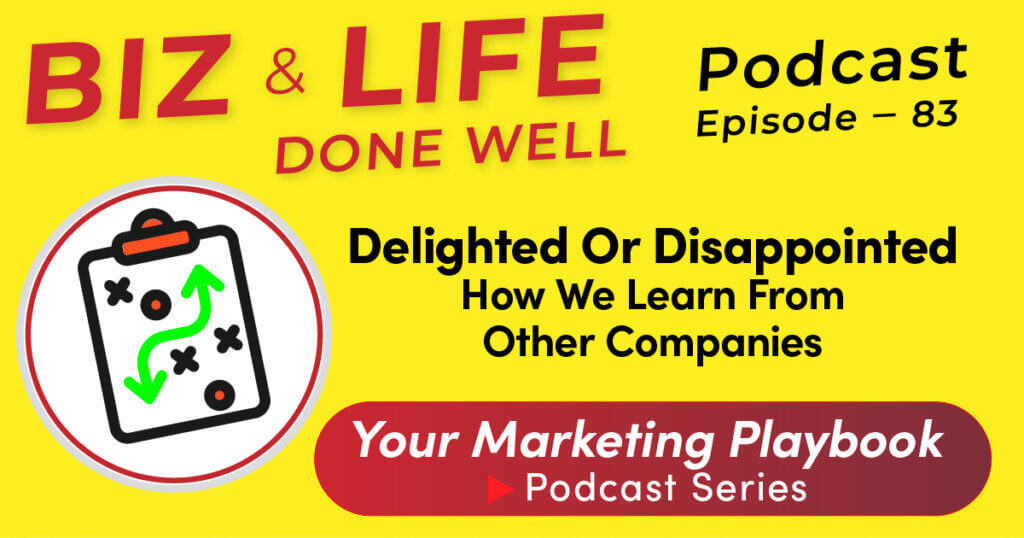Title: Delighted Or Disappointed – How We Learn From Other Companies **1PMP Series**
Featuring: Peter Wilson
Peter: We’re continuing our journey through the one Page Marketing Plan by Alan Dib. And this week, I’m really excited to share the topic chapter seven, which is delivering a world class customer experience, or he calls it delivering a world class experience. This is the phase after the customer has purchased from you. What are you going to do? Well, he recommends delivering a world class experience.
Just to catch you up, we’ve gone through the before phase, which is time before a customer knows who you are, and you’re selecting your target market. You’re crafting your message, and you’re reaching prospects with advertising and other media. That’s before they know who you are. The during phase, which is after they know who you are, you’re capturing leads, you’re nurturing leads, and then you have, sales conversion. So we’ve covered each of these topics in podcasts.
Previously, if you look in our podcast for one PMP series, we’ve added that to the end of the titles of each of our podcasts, and you can see which ones carry that. So this week, again, this is the after phase after a customer has purchased from you, delivering that world class experience. Before we go through the chapter of what Alan talks about, I did want to share with you something that we do at bizmarketing.com on our weekly team meetings. We have a thing called delighted or disappointed, where different team members each week shares an experience that they had with a company where they were either delighted or disappointed. Our goal is to learn from these experiences.
So I thought I’d just share a few of the experiences that we have. Maybe you can detect some themes here. We learn a lot just by paying attention to what other companies are doing around us. Let’s start off with disappointed. Here are a few that really stuck in our craw in terms of disappointing us.
Wayfair, which is an online furniture store. We actually had a couple disappointments. One was Tim, who was disappointed with the instructions that he received, the minimal instructions, and it was mainly very small pictures that were hard to understand. And then there was another example where another team member bought from Wayfair and had to wait three weeks for replacement parts and things were actually broken. So two examples of Wayfair just really disappointing folks.
We had one team member who was disappointed by two companies on different occasions. One was US Bank, the other was Adobe. Now, you’d think, what do those two have in common? Not much. Except the way they disappointed our team member was their banking server was not online, and then the Adobe servers were not online.
Ten, twenty years ago, we didn’t think about this, where you’re expecting servers to be online so you can get work done. Well, now, we definitely expect that. This person was indicating that that happened with him, with both US Bank and Adobe, and it really left a bad taste in their mouth with both of these companies. They need to get better on their reliability. Now let’s move on to Delighted.
So the top company that created Delight, Apple was number one. Multiple instances going back, we keep track of these in a weekly meeting log so we can go back and review. And we started doing this back in 2017 or 2018, so we’ve been doing this for quite a while. But Apple again had multiple instances of delight, including somebody that got free AirPods when they bought an iPad. AppleCare provided local one hour service.
Back in COVID times, they were very precautious with safety at the store. And then another individual got a laptop purchase directly through Apple, one is extremely delighted with that experience. So Apple must be doing something right. Now, another one that kind of stuck out was Enterprise rental car. Generally, a rental car is not what I would think as being a type of company that’s going to delight anybody.
It’s more like when I think of rental car, just think about which company will give me the least disappointment. But two of our team members were delighted with Enterprise rental car, and they were both praising them for easy to get pickup and drop off. And then in one case, somebody said that they honored a special price quote that was not available. They couldn’t find it online, but it was a quote that they had received in some fashion and Enterprise Rental Car went ahead and honored that price quote. Apple and Enterprise, hats off to you.
Wayfair, US Bank, Adobe, you got some work to do. What Alan talks about in the book in terms of delivering a world class experience, he talks about creating raving fans. And what he’s really talking about here is creating customers that are going to even act as cheerleaders. Now, Apple has a lot of cheerleaders, and I would say that Apple is one of those companies that’s created a tribe of raving fans. The question is, how do we do this as a business owner?
It’s one thing to be Apple, but it’s another thing to be a company that is a smaller company and doesn’t have the resources that a company like Apple does. So the first thing that he recommends is to sell folks, sell them what they want, and give them what they need. What he talks about is if you are trying to sell a product, for example, you’re selling a treadmill, why are people going to buy a treadmill? They’re probably not looking at the thing like, Oh, I want to have this big thing in my room. It’s going to take up a lot of space.
Thinking about when they buy that is they’re thinking about being healthier, they’re thinking about losing some weight, they’re thinking about looking better, feeling better, having a toned body, ripped abs, a great figure, etc. But the challenge is just the act of buying a treadmill is not going to get you there. It’s not going to create that peak fitness and all of that. What’s missing here is you’ve sold folks what they want, and what they want is they want the ripped abs and all that. But actually, you sold them a treadmill.
So what you need to do is not just sell them the thing that they bought. You sold them and then walk away and say, hey, you’re on your own. If you really want to be as successful as a business, you have to think about, Okay, what’s missing? What are they going to need after they get this treadmill home? So if you combine that treadmill with some type of a program that is going to ensure, or at least increase the likelihood that they’re going to actually use it.
And as he says, in many cases, it’s going to mean you need to spoon feed people through the process of getting the results that they want. A good example of this would be Peloton with their bikes and treadmills. They’re not just selling you an exercise bike, they’re actually selling you a whole package of classes. They’re actually creating this experience for you where you can participate with others and you can, in some respects, you can get an experience like you would get in a gym where you’re high fiving your friends, they’re showing up, you’re working out, you’ve got the music going, and you’re motivated to show up. And so they’ve done a good job of figuring out the both sides of the equation.
They’re selling you a very expensive exercise bike, and they’re selling you a subscription to a service that is hopefully going to keep you motivated to do what you need to do to see the results that you want to see. So I think that was a good example of that, which is both selling not just what they want, but giving them what they need. Another example that Alan talked about was using technology to reduce friction. Anything we can do to automate the purchase and payment, and beyond that, how they use your product is going to make it easier for them to do that. And he uses an example here, don’t know if you remember this, but back when the iPod came out, the only way to legally get music into it was to drive down a local music store and buy a CD, and then insert the CD into your computer, import it into computer hard drive, and then sync the iPod with the computer so all the music got copied over.
And despite that painful process, it was a huge success. But then when Apple introduced the iTunes Store, which made it extremely easy to get that music in there. It just exploded, probably ten, twenty x the sales of the device. Because of that, it just reduced the friction so much when they came out with the iTunes Store. Another thing that Alan recommends is becoming the voice of value for your tribe.
And this is something that we try to do, and this podcast is part of that. And one of the things that we’re trying to do is create value for our customers by continuing to educate, just put out as much value as we possibly can. And in our case, it’s something we know about, it’s marketing. But you could apply this to any business. If you’re a dentist, it makes sense to put out information to your patients about teeth, caring for their teeth, maybe new procedures that are available.
There are many different things that you can think of with respect to your health. It could be some healthy habits, could be certain foods that are good to eat, things that are good for your teeth, things like that. If you’re a roofing company, maybe you’re just putting out information about things to look for throughout the year on your roof, or maybe a treatment you should put on it. If you are a plumber, you could be putting out information about what you shouldn’t put down your sink, for example. Anything you can do to educate your customers to help them continue to get value out of the relationship they have with you is going to go towards delivering that world class experience.
One of the other items that Alan talked about, I thought this was really cool. He said, Tell your customers about all the trouble you go to. And I thought, Wow, that’s interesting. What does he mean by that? Well, has an example in the book of, apparently, he lives, there’s a a place where at his grocery store where you can download different shampoos into bottles.
And there’s one it’s a body wash or a shampoo. It looks like a body wash. One of them just says Luxe. Says the word Luxe, basically. And then the ones right next to it, it’s got all this wording on it.
Forty nine bee hives helped make one of the most nourishing and original shea butter and honey shower gels. And that was the packaging on the large container where you could download the the shower gel. And this other one says 7,927 real mint leaves make one tingling bottle of original source mint and tea tree shower gel, sort of implying that there’s a lot of time and energy went into making this. And if you compare it to the Luxe shower gel that’s sitting next to it, it seems like these original Source brand are much more interesting and probably sell a lot more too. Another example he uses in the book is of Guinness.
And if you’ve ever had a Guinness, you know that it takes a long time to fill the glass. And there’s this process of nucleation where the pockets of air from the bubbles diffuse through the beer, and it takes a long time to fill the glass up because of that. Right now, we appreciate that. That’s kind of a hallmark of Guinness, but back in the day, people didn’t like that. They thought that it took too long.
That created kind of a negative opinion about the beer. So what Guinness did is during the nineties, they turned it all around by creating a marketing campaign that sold this negative attribute as a a positive feature. Basically, they started telling people how much effort went into pouring the perfect beer. They emphasized this by saying it takes a hundred and nineteen point five seconds to pour the perfect pint, and good things come to those who wait. I really like that.
They’re taking a negative and turning it around. So this goes into emphasizing what goes into making your product or delivering your service. And I think this is really important and something that a lot of businesses overlook, ours included, because we would rather just tell the customer the bare minimum of what they need to know in order to purchase the product. But it would actually create more loyalty and make it more interesting as well if we would give a little more information about the trouble that we go to in terms of creating the product that we’re selling. So that’s it for the Delivering a World Class Experience from Alan Dib in chapter seven of the one Page Marketing Plan.
If you’d like to learn more about applying the principles of the one Page Marketing Plan to your business, please contact us, bizmarketing.com. Click on the book consultation button on our website. Thanks for listening to this episode of Biz and Life Done Well with Peter Wilson. You can subscribe to us on iTunes, Google Podcasts, Spotify, and most of the other popular podcast platforms. Please tell your friends about us and leave us a review so even more people will find out about us.
Thanks again. We’ll see you soon.



